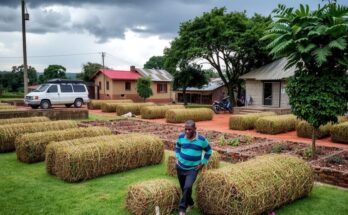The article discusses how Tanzanian communities, in response to deepening drought caused by climate change, are adapting through a project offering sustainable water solutions and economic diversification. Led by the Tanzanian Vice President’s Office and UNEP, the initiative has installed solar-powered boreholes, promoted land use planning, and helped communities establish new income-generating activities, thereby enhancing resilience against climate impacts.
Communities in Tanzania, particularly in the Dodoma region, are grappling with the severe repercussions of climate change, notably deepening droughts. Asherly William Hogo, a cattle farmer, recalls the arduous journey of seeking water for his animals, a venture that has been transformed since the installation of a solar-powered borehole and large rainwater reservoir in his village, Ng’ambi. This initiative, spearheaded by the Office of the Vice President of Tanzania and the United Nations Environment Programme (UNEP), aims to assist approximately 35,000 residents affected by climate impacts. The initiative has been significant in counteracting the dire effects of erratic rainfall and drought that have led to crop and livestock losses, as highlighted by Mirey Atallah, the Head of UNEP’s Adaptation and Resilience Branch. The project is timely, as Tanzania faces unprecedented weather challenges, including extreme drought followed by devastating floods. This drastic alteration of climate patterns presents a compelling case for immediate action to prevent further degradation of both the climate and rural community stability. Since the project’s inception in 2018, it has successfully drilled numerous boreholes, with 12 being solar-powered and constructed earthen dams that can capture substantial rainfall. Beyond water security, the project has significantly involved community land use planning to bolster resilience against climate changes in villages reliant on rain-fed agriculture. Key to the success of this project is the integration of ecological restoration, such as rehabilitating over 9,000 hectares of land and planting 350,000 trees to enhance water cycles and reduce flooding risks. Alongside these environmental initiatives, residents are engaged in alternative income-generating activities, including beekeeping and mushroom cultivation, providing them with financial safety nets. The project’s empowerment extends to women, equipping them with skills traditionally reserved for men, thus addressing gender disparities in labor roles. As the UNEP project nears its conclusion in December 2024, it is anticipated that nearly 3,800 households will experience increased income and improved resilience against climate-induced adversities. In summary, the ongoing climate crisis necessitates collaborative efforts towards effective adaptation strategies, such as those implemented in Tanzania. The future of rural communities hangs in the balance as they strive to mitigate the harsh realities of climate impacts through innovative practices and partnerships.
The article highlights the ongoing climate crisis affecting Tanzania, particularly the debilitating effects of drought and erratic rainfall on rural communities dependent on agriculture. The Government of Tanzania and UNEP have initiated significant projects to enhance water access and empower communities through sustainable practices and economic diversification. The focus on integrating ecological restoration with community resilience is essential in the context of climate change, as it presents a holistic approach to adaptation and mitigation efforts.
In conclusion, the initiative led by the Government of Tanzania and UNEP serves as a vital response to the escalating challenges posed by climate change. Through cooperative efforts in water management, ecological restoration, and economic diversification, Tanzanian communities are being equipped to face the realities of a changing climate. This project represents an essential model for adaptation strategies that could be replicated in other regions confronting similar environmental threats.
Original Source: www.unep.org




